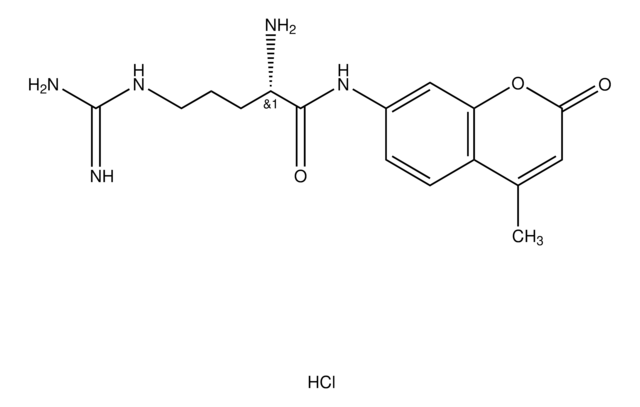SML1276
BAZ2-ICR
≥98% (HPLC)
Synonym(s):
4-{4-(1-Methyl-1H-pyrazol-4-yl)-1-[2-(1-methyl-1H-pyrazol-4-yl)-ethyl]-1H-imidazol-5-yl}-benzonitrile
About This Item
Recommended Products
assay
≥98% (HPLC)
form
powder
color
white to beige
solubility
DMSO: 10 mg/mL, clear
storage temp.
2-8°C
SMILES string
CN(N=C1)C=C1CCN2C=NC(C3=CN(C)N=C3)=C2C4=CC=C(C#N)C=C4
InChI
1S/C20H19N7/c1-25-12-16(10-23-25)7-8-27-14-22-19(18-11-24-26(2)13-18)20(27)17-5-3-15(9-21)4-6-17/h3-6,10-14H,7-8H2,1-2H3
InChI key
RRZVGDGTWNQAPW-UHFFFAOYSA-N
Biochem/physiol Actions
To learn about other SGC chemical probes for epigenetic targets, visit sigma.com/sgc
Features and Benefits
Other Notes
related product
signalword
Danger
hcodes
Hazard Classifications
Acute Tox. 3 Oral
Storage Class
6.1C - Combustible acute toxic Cat.3 / toxic compounds or compounds which causing chronic effects
wgk_germany
WGK 3
flash_point_f
Not applicable
flash_point_c
Not applicable
Certificates of Analysis (COA)
Search for Certificates of Analysis (COA) by entering the products Lot/Batch Number. Lot and Batch Numbers can be found on a product’s label following the words ‘Lot’ or ‘Batch’.
Already Own This Product?
Find documentation for the products that you have recently purchased in the Document Library.
Articles
We offer a variety of small molecule research tools, such as transcription factor modulators, inhibitors of chromatin modifying enzymes, and agonists/antagonists for target identification and validation in gene regulation research; a selection of these research tools is shown below.
Our team of scientists has experience in all areas of research including Life Science, Material Science, Chemical Synthesis, Chromatography, Analytical and many others.
Contact Technical Service









